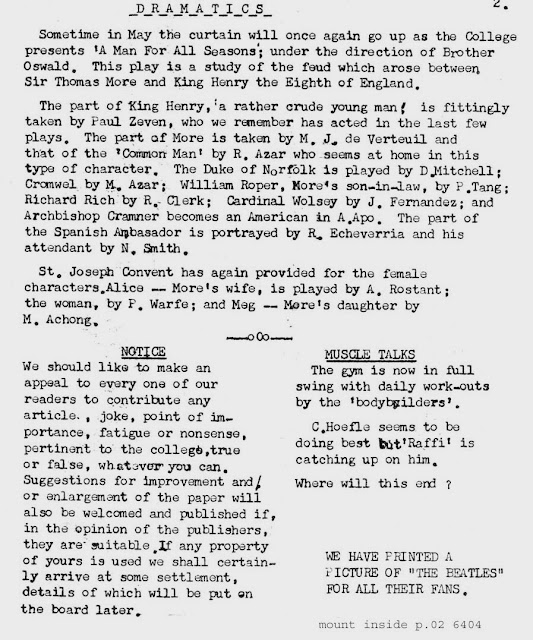

Newsletter for past alumni of The Abbey School, Mt. St. Benedict, Trinidad and Tobago, W.I.
Caracas
Dear Friends,
Dear Friends,
2. Manuel Prada
3. Richard Galt
4. Michael Herrera
5. David Pampellone
6. Ladislao Kertesz
7. Michael Howard
8. Randal Galt
9. James Seheult
10. Michael King
11. Wayne Vincent Brown
12. Egan Baichoo
13. Matias von Fedak
14. David de Verteuil
15. Christopher Webster
16. Roger Henderson
17. Giuseppe Braggio
18. Nigel Boos
19. Geoffrey Golding
20. Anthony Johnson
21. Daniel de Verteuil
22. Christopher Knowles
23. Maurice de Verteuil
24. Fr. Paul
Richard Gransaull until From IV.
Basanta dayboy from Tunapuna
---------------------------------------------------
The photo: A rocket that was built during my last year at the Mount.
---------------------------------------------------
Here I am continuing the who’s who, thanks to Roger Henderson:
7. David Bratt is a leading paediatrician in
----------------------------------------------------
God Bless
Ladislao
-----------------------------------------------------
Listado: C17.xls
Photo: msb rocket
Article: Msb p2 6404 mount inside
Column: wvb 020303
Cuba jottings – By Wayne Brown
Sunday, March 24, 2002
|
LIKE most Caribbean capitals, Havana Havana
It feels like a metaphor for the socioeconomic dousings -- both exhilarating and alarming at once -- of Havana
Some numbers:
In the old Cuba
As is apparent from this, the old Cuba Cuba is memorable for many things, but its cooking is horr-a-ble!, Spartan in the extreme: a peculiarly jarring absence of Caribbean creolisation in an area where you'd least expect it.)
Part of the problem is availability: eggs, eg, were almost impossible to find while I was in Havana (which is presumably why an egg sandwich at a tourist restaurant cost US$6 -- meaning that a top-ranked Cuban professional could, if he were so disposed, spend his month's salary availing himself of three egg sandwiches and two soft drinks.) The premise is that the state was directing a disproportionate number of eggs to hatcheries. Yet, the average Cuban -- reports a recent issue of National Geographic -- can aspire to chicken no more than two to four times a year. (When in the weeks after my surgery I routinely left untouched my plate of baked-without-seasoning chicken and steamed-without-salt vegetables, I often noticed how circumspectly the female orderly surveyed the terrain outside my room before choosing the right moment to spirit it away.)
Likewise, a large and quite impressive 'upmarket' restaurant has no problem serving you a smoked pork sandwich when you order a hamburger (no ground beef today), or black coffee whether you like it or not (no milk today).
When, on our last night in Cuba, therefore, my daughter proposed we order takeaway for six (to include a couple Cuban and Jamaican friends) from the place she'd 'discovered', it meant that the little home operation, from its menu prices, would gross something like US$80 -- a real windfall in the context of Cuba. The operators, however, had no experience of advance orders (we were calling in the morning and wished to collect it in the evening); they were suspicious and unhelpful; and in the end we gave up and ordered Chinese instead.
The great Havana
The restraint of the artist-entrepeneurs was impressive. Evidently (like hair-braiding women on the beach in The Bahamas) they were not permitted to speak to a prospective customer unless (s)he talked to him/her first. And so they sat, looking expectantly at you, but biting their lip -- a welcome change from the urgent hustle you'd experience here.
At the market, too, were scores of prostitutes (too many for comfort, really); and while I regret to report that I omitted to play the social anthropologist and grill them on their fees and practices, they were manifestly younger, more attractive, more seductively (as opposed to vulgarly) dressed, and clearly of a much higher 'class' than their Jamaican street-counterparts -- though that last comment is anachronistic in more ways than one. People are poor in Cuba
But all this is tourist talk, and it misses the essential niceness of the Cuban people. It was one of the first things that struck me, coming from Jamaica Havana Trinidad in the 50s. In Old Havana, in the upstairs hotel room with the little balcony where Hemingway stayed when he first visited Cuba in the 20s -- and where he allegedly wrote The Short Happy Life of Francis Macomber -- the tour guide (who came on duty just for us) spoke of him (in good English) without hype, yet with knowledge, friendliness and respect.
Still -- the Cuba Cuba Cuba
When I told the head of the cardiology hospital where I'd been a patient that after I was discharged I might go for a brief convalescence to the Sandals-managed Beaches Resort at Varadero, his response sounded odd to my ears.
"Congratulations," he said; and I looked and saw -- and this was the odd thing -- that he meant it.

No comments:
Post a Comment